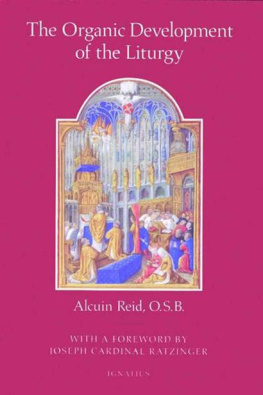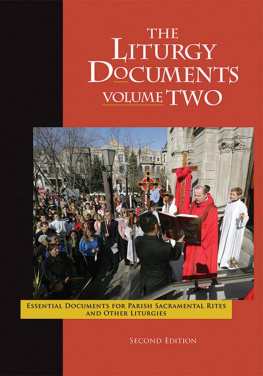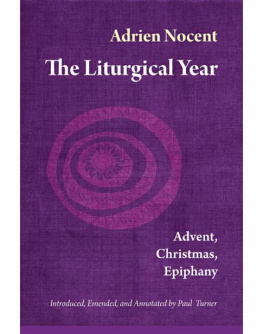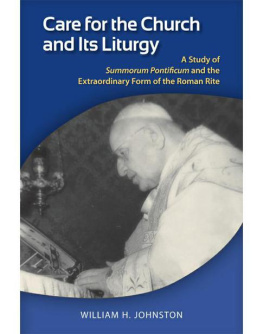
Contents
T HE G ENIUS OF THE R OMAN R ITE: H ISTORICAL, T HEOLOGICAL AND P ASTORAL P ERSPECTIVE ON C ATHOLIC L ITURGY 2010 Archdiocese of Chicago: Liturgy Training Publications, 3949 South Racine Avenue, Chicago IL 60609; 1-800-933-1800, fax 1-800-933-7094, e-mail .
Hillenbrand Books is an imprint of Liturgy Training Publications (LTP) and the Liturgical Institute at the University of Saint Mary of the Lake (USML). The imprint is focused on contemporary and classical theological thought concerning the liturgy of the Catholic Church. Available at bookstores everywhere, through LTP by calling 1-800-933-1800, or visiting www.LTP.org. Further information about the Hillenbrand Books publishing program is available from the University of Saint Mary of the Lake/Mundelein Seminary, 1000 East Maple Avenue, Mundelein, IL 60060 (847-837-4542), on the Web at www.usml.edu/liturgicalinstitute, or e-mail litinst@usml.edu.
Cover image The Crosiers/Gene Plaisted, OSC
Digital editions, August 2012, ISBN 978-1-61833-023-9
HGRRE
Acknowledgments
Thanks are due to the Benedictine nuns of St Cecilias Abbey, Ryde (Isle of Wight) for translating Abb Claude Barthes paper from French, to Father Andrew Wadsworth for translating Don Nicola Buxs paper from Italian, and to Alexander Morrison for translating P. Gabriel Dazs paper from Spanish. The editor is also indebted to Catherine Donner and Owen Curry for their help with preparing the manuscript.
An earlier version of Dr. Cristina Dondis paper can be found under the title Liturgical Policies of the Hospitallers between the Invention of Printing and the Council of Trent: The Evidence of the Early Printed Breviaries and Missals, in V. Mallia-Milanes (ed.), The Military Orders. Volume 3: History and Heritage (Aldershot: Ashgate, 2008).
Introduction
Uwe Michael Lang
This book contains the proceedings of the 11th International Colloquium of CIEL ( Centre International dtudes Liturgiques International Centre for Liturgical Studies), held in Merton College, Oxford from September 13 to 16, 2006. CIEL was founded in 1994 to promote the study and appreciation of the traditional liturgies of the Catholic Church, in particular the Roman rite. The organizations earlier colloquia were held in France, and since 2005 regular meetings have taken place in Rome. The proceedings of the previous colloquia were published in English translation by the UK branch of CIEL. The 2006 conference was the first one to be hosted by CIEL UK and has opened a new chapter in the history of these colloquia, with most papers being delivered in English and many participants coming from the Anglophone world.
The title chosen for the Oxford colloquium and for this volume refers to an influential essay by the English liturgical scholar Edmund Bishop (18461917), The Genius of the Roman Rite:
Some one a very long time ago described Genius as Son of the Gods and Father of Men. It is thus that we speak of the Genius of a peoplethe French or the English, the German or the Italian; a something intangible and indefinable, it is true, but a permanent reality that we can quite well apprehend; a characteristic and distinguishing spirit that manifests itself in all that that a people says and does, in its history and its literature; determining the character of both, and affecting the general character even of its thought.
An enquiry into the genius of the Roman rite is therefore an endeavour to get at, and to recognize, the particular, the native spirit animating and penetrating that rite, which differentiates it from others, Gallican or Gothic, Greek or Oriental.
The papers collected in this volume cover a variety of topics, ranging from studies of Latin liturgical prose and poetry, the music proper to the Roman rite, the development of the Churchs sacred year, the liturgies of the military religious orders to treatments of important theological topics. However, all of these contributions capture something of the genius of the Roman liturgical tradition. As is evident from the opening paper by Eamon Duffy, this kind of scholarly reflection is very appropriate in the pontificate of Benedict XVI, who as a cardinal has written extensively on the liturgy and as pope has made important pronouncements on the subject, especially in the Post-Synodal Apostolic Exhortation Sacramentum Caritatis of February 22, 2007, and in the Motu Proprio Summorum Pontificum of July 7, 2007. The latter document, which came into force on September 14, 2007, lifted previous restrictions for the celebration of Mass and of the other sacraments according to the liturgical books used until the reform following the Second Vatican Council.
The Pope declares in his explanatory letter to the bishops accompanying the Motu Proprio that the older form of Mass according to the Missale Romanum of 1962 was never juridically abrogated and, consequently, in principle, was always permitted.
But Pope Benedict goes beyond exhortation, by establishing the rights of the faithful in terms of canon law, the law of the Church. This is not another indult, or special permission, it is much more than that: each Catholic priest of the Latin rite has the right to celebrate Mass according to the Missale Romanum of 1962, and the lay faithful, for their part, have the right to request such a celebration. The Holy Father recognizes that those who are drawn to the older form of Mass are not only people who grew up with it. Today, more than forty years after Vatican II, many younger people have come to know and appreciate it. This is not just nostalgia or aestheticism; it is a real love for the Churchs liturgical tradition, which nourishes and sustains their Christian lives.
The Motu Proprio Summorum Pontificum is a defining moment in the pontificate of Benedict XVI. And the main theme of this document and the explanatory letter is reconciliation: in the first place, reconciliation of the Church with her own tradition. For years, it was insinuated that those who were attached to the older liturgy were disobedient. Even from a merely psychological point of view, such a rejection of ones own past must have disastrous effects. The Bishop of Eichsttt in Germany in his statement welcoming this papal document says that we must overcome the liturgical Oedipus complex
Vatican II reaffirmed traditional teaching, when it proclaimed that the liturgy is the summit of all the Churchs activities, and the source from which all her power flows.
For years now, the rite as the condensed form of living Tradition has been a controversial topic in the Catholic Church. The post-conciliar reform of the Roman rite of Mass was implemented with great haste, and in its wake liturgical abuses have become widespread. This situation has generated skepticism even among those whose loyalty to the Second Vatican Council cannot be doubted; they wonder whether the principles according to which the celebration of Mass was changed do justice to the traditional understanding and practice of the faith, or whether they are, at least in part, alien to them.
It is a fact that the Catholic liturgy is not in good shape todaynot everywhere, not in every parish, but on balance and in every corner of the world. The Pope is very frank about this, when he speaks of deformations of the liturgy which were hard to bear, and then adds on a personal note: I am speaking from experience, since I too lived through that period with all its hopes and its confusion. And I have seen how arbitrary deformations of the liturgy caused deep pain to individuals totally rooted in the faith of the Church. These words reflect the pastoral care of the Successor of Peter and need to be taken seriously. They also echo what Joseph Ratzinger said about the present crisis of the liturgy before his election to the Apostolic See. He repeatedly called for a wider use of the old liturgy and for a reform of the reform. The Motu Proprio Summorum Pontificum is already achieving the former, and I am convinced it has also initiated the latter. The difficulty with the reform of the reform project is that the liturgy is never made or fabricated. It develops and grows organically. As much as a reform of the reform is necessary, it cannot be made or fabricated either. There is the danger that a reform of the reform, however conscientiously executed, would make similar mistakes to those made by the reformers of the sixties and seventies.


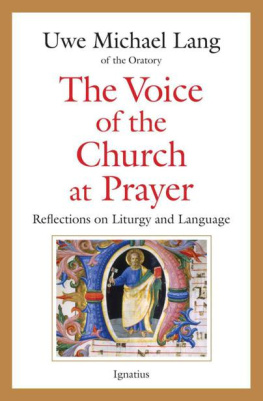
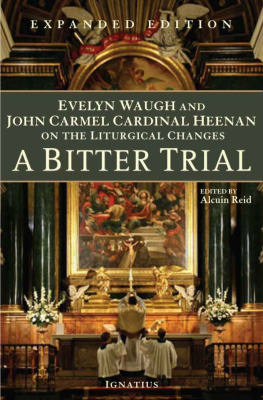
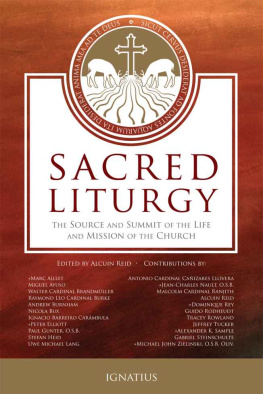
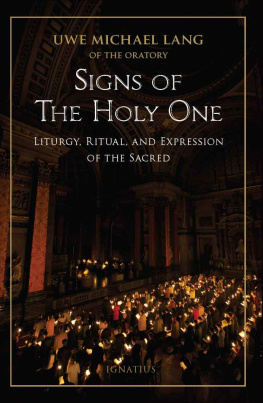
![Pope John XXIII - The Roman Missal [1962]](/uploads/posts/book/272720/thumbs/pope-john-xxiii-the-roman-missal-1962.jpg)
